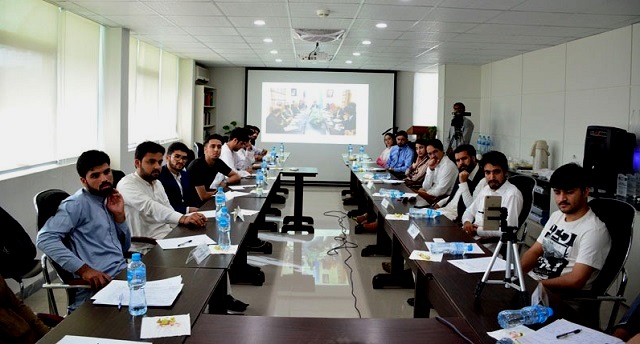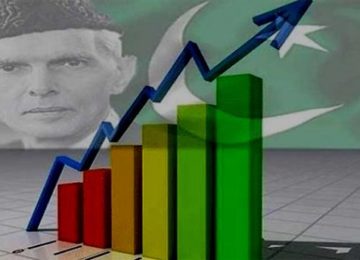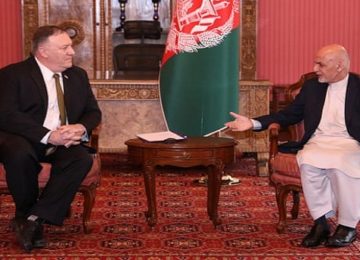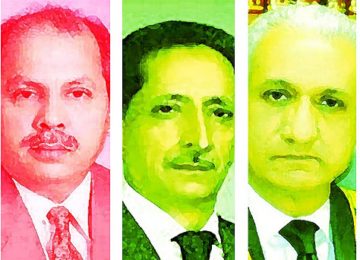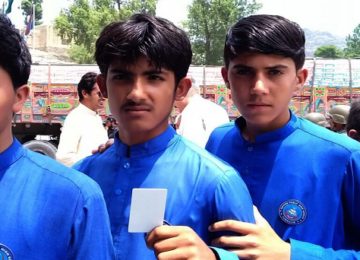While the expressions ‘brothers’ and ‘conjoined twins’ used for Pakistan and Afghanistan by former President Hamid Karzai can be applied to the people of both countries, the state-to-state relationship between the two has always remained a challenge. This is particularly because whenever any positive development between the two has been pursued in the past, it has unfortunately been followed by an immediately occurring negative event that re-erects the wall of trust deficit on both sides. Senior Journalist and Analyst Hasan Khan believes the elephant in the room in this regard is the US which has the key to peace in Afghanistan if it sincerely worked towards it with all stakeholders taken aboard. However, he also acknowledged that peace in Afghanistan can only be achieved through an Afghan-owned and Afghan-led well-defined policy framework which Pakistan has time and again expressed its complete support for. Hasan Khan, who was invited as a key speaker at the 11th Pak-Afghan Youth Dialogue at the Center for Research & Security Studies (CRSS) alongside honorable Ambassador Ayaz Wazir, was speaking to young Afghans and Pakistanis enrolled in various universities of Pakistan on the theme, ‘Resumption of Pak-Afghan State Level Dialogue & Future Bilateral Prospects’ on Wednesday, April 25, 2018.
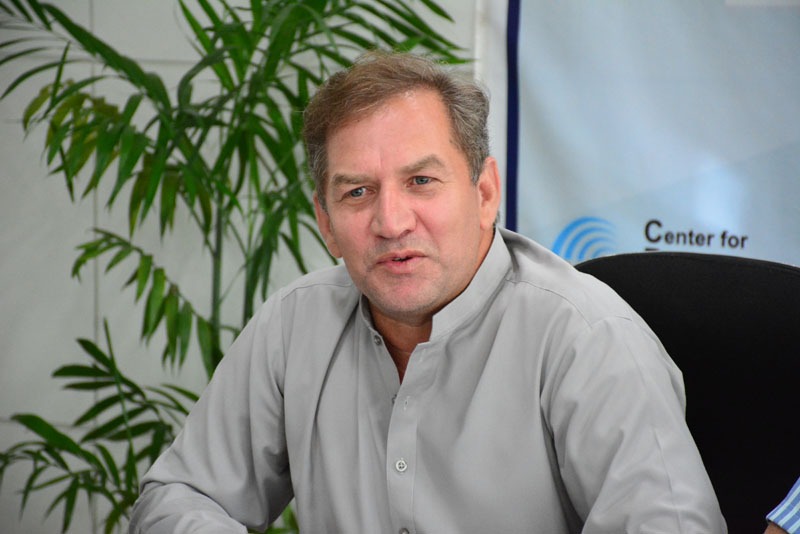
Ambassador Ayaz Wazir, who was also invited as the Chief Guest and was moderating the session, proposed that the right direction to set in the bilateral relations of Pakistan and Afghanistan is to start with free-flowing trade between the two; as the modern mantra for development is to delink trade from politics. Trade would make space for cooperation in other arenas, and eventually impact politics positively as well, he asserted. There have been periods when both countries enjoyed reasonably pleasant relations; though admittedly never excellent, the Ambassador stated, the Pak-Indo 1965 War is one such example when, despite fractured relations between Pakistan and Afghanistan, the latter called on Pakistan’s Ambassador in Kabul and conveyed to the Government of Pakistan that it should not worry about any threat to its Western border at that time. Some even say that Kabul offered Pakistan to park its aircrafts inside Afghanistan if the latter required.
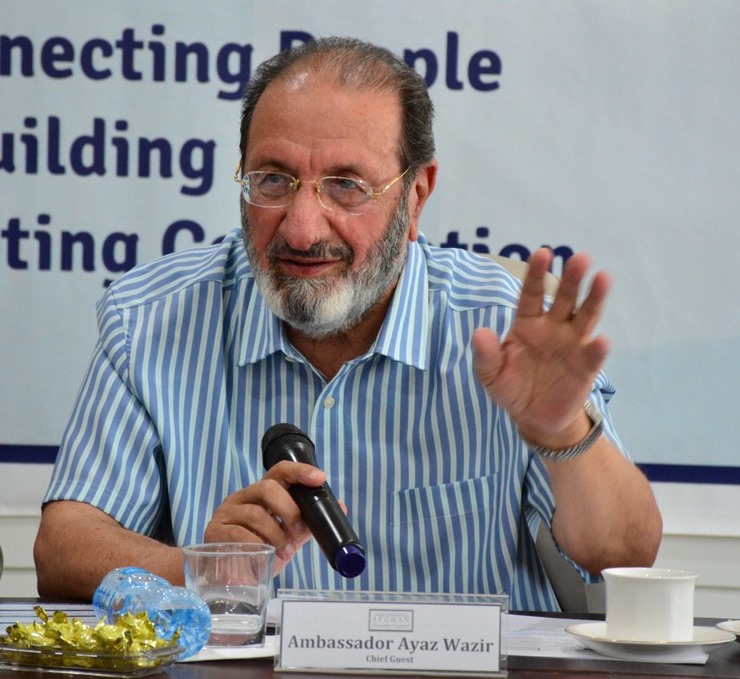
Hasan Khan stated that the latest engagements between the top leadership of Pakistan and Afghanistan, initiated by Pakistan’s Army Chief General Bajwa, however, for the first time in a long while have gone beyond just rhetoric to shed light on required actions on areas of mutual concern. This move of General Bajwa was reciprocated by President Ghani with an invitation to Pakistan’s PM Abbasi to visit Kabul which materialized last month and resulted in his productive meetings with Afghanistan’s top leadership from almost all ethnic backgrounds.
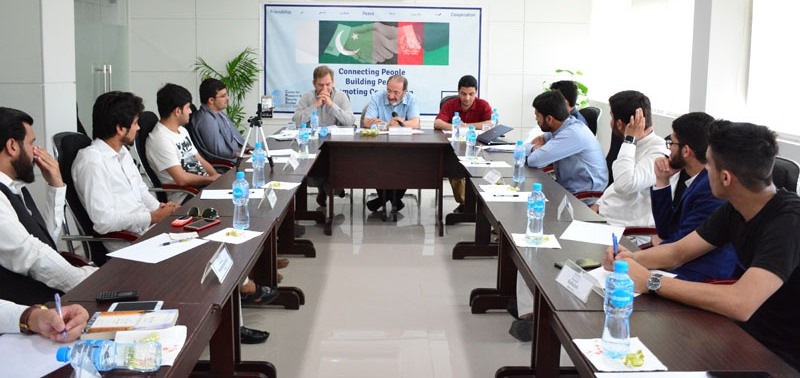
The most prominent resolution from the recent dialogue has been a mutual consensus from both sides to refrain from public accusations towards each other and instead take matters of concern to the relevant working groups jointly formulated by the two countries. This development has positively helped in bringing down the political temperature so far and set a slightly conducive environment for future cooperation in several wide-ranging areas, he said.
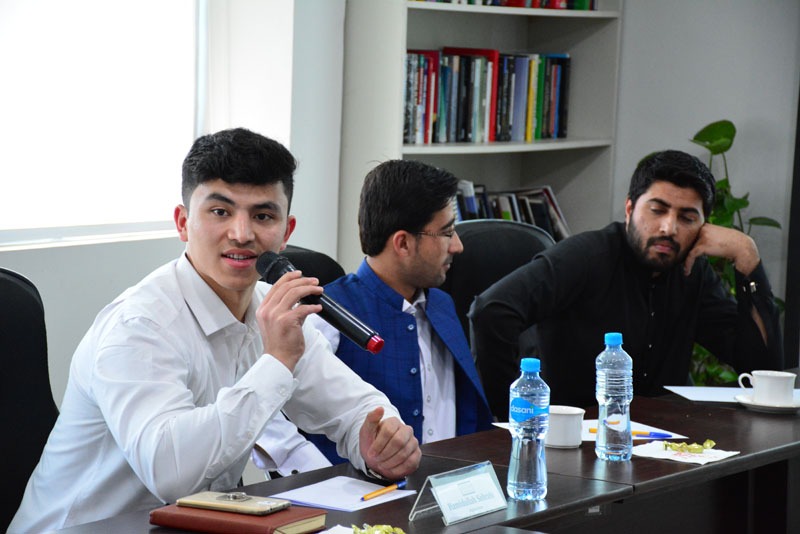
Ambassador Ayaz Wazir opened the floor for an interactive question & answer session where participants raised several points. The major concern of most participants was why Pakistan and Afghanistan, despite being two inseparable neighbors with so many commonalities, have failed to resolve their issues in a swift manner so as to end the miseries of people that affected due to their relations. Others posed questions to the Speakers regarding how the prevailing negativity towards each other in some quarters on both sides of the border can be tackled and also what should be the way forward for achieving peace in Afghanistan. Responding to these queries, the chief guests stated that the complex issues between Pakistan and Afghanistan should not be expected to get fixed swiftly. Rather the pragmatic way for both sides to build trust is to begin with areas where they can cooperate for mutual benefits, such as trade, which would act as a confidence building measure towards eventually seeking solutions for the complex ones. Commenting on the existing negativity on both sides, the Ambassador urged that the people of both countries should not get carried away by pessimistic propaganda created by some factions and instead focus on positive developments and work towards consolidating them. Responding to the query regarding the way forward for peace in Afghanistan, the chief guests suggested that the Afghan leadership should once and for all get united and convince the United States to aim at peace only in practical terms.
Saddam Hussein, Program Officer at Afghan Studies Center, also apprised the participants about the ongoing CRSS Pak-Afghan Track 1.5/II Initiative ‘Beyond Boundaries’ which has worked in this regard since late 2015 and convened high level unofficial meetings between the two countries to bridge the gulf of mistrust and improve bilateral relations between Pakistan and Afghanistan. He further told the participants that the idea of Afghan Studies Center emerged as an off-shoot of the above mentioned initiative, exclusively to provide the youth of both countries to interact, exchange ideas and engage in joint research ventures, as they are the real future leaders of the two countries.


At the end of the session, Ambassador Ayaz Wazir nominated Hamidullah Sohrabi from Afghanistan as one of CRSS’ Pak-Afghan Youth Ambassadors for 2018, presenting him a shield for this award. The Ambassador also presented a shield of appreciation to the key speaker, Mr. Hasan Khan, for his valuable insights on the theme while on behalf of CRSS, Ambassador Ayaz Wazir was also presented a shield as a note of thanks for his valuable time and insights. Afterwards, the participants spoke to Khyber News regarding their experience at the forum and shared the youth perspective on the new developments in Pak-Afghan relations.


This was the 11th Pak-Afghan Youth Dialogue organized by the Center for Research and Security Studies under its Afghan Studies Center initiative aimed at bringing the youth of both countries together on one platform, marking the anniversary of Afghan Studies Center which was launched last year on April 25, 2017.
© Center for Research and Security Studies (CRSS) and Afghan Studies Center (ASC), Islamabad.



